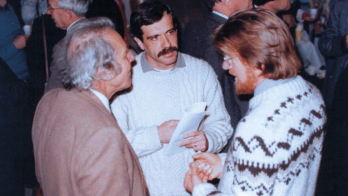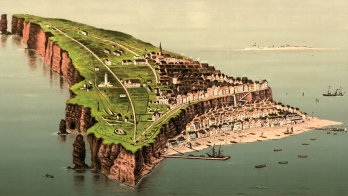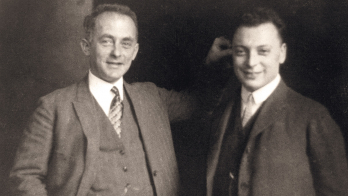By Jean-Marc Ginoux and Christian Gerini
World Scientific
Hardback: £19
E-book: £14

Henri Poincaré: A Biography Through the Daily Papers – where papers clearly include letters, because many are included – has caused some confusion in my mind. Turning the pages, it is hard to know where I am in time, and the events that are described seem to be of sub-relevance to what I was keen to read about. Two towering examples concern Poincaré’s relation to politics and relativity.
I note that despite extensive discussion of his interaction with the daily press, there is only the briefest mention that Henri Poincaré had an influential cousin, Raymond Poincaré, who was president of France during the years 1913–1920 (and so covered the First World War), and before that a member of the French parliament, and on several occasions minister or prime minister. I had been hoping to learn how close Henri was to Raymond and how this impacted on the opinion of the French public on both of them – a genius mathematician and a powerful politician from the same family.
I also hoped for a discussion of the relation of Henri Poincaré to Hendrik Antoon Lorentz and Albert Einstein. There is only one phrase, on page 212 at the end of the subsection on an “old quarrel” with Einstein – and in my view this is inaccurate. What I know from having read some of Poincaré’s research papers is that it was Lorentz who was castigated by Poincaré for “needing five pages where five words suffice” (I paraphrase). The situation with Einstein seemed more complex. Here I was seeking clarity. Everybody “knows”, and therefore in accord with diplomatic traditions, this book avoids any explicit mention of what is, in my opinion, the historical-context issue of importance.
A search on the web reveals a recommendation letter from Poincaré regarding the appointment of Einstein at ETH-Zurich written in November 1911. In this letter, Poincaré the mathematician, who died in 1912, characterizes Einstein the young physicist, who became noticed around 1907–1912, as an oddity among scientists, deserving a mention for this reason: “Mr Einstein is one of the most original thinkers I have ever met,” and going on to say, “Since he seeks in all directions one must…expect most of the trails which he pursues to be blind alleys.” This shows that Poincaré died in ignorance of the fact that Einstein had already created several new paradigms of science, of which (special) relativity was directly related to Poincaré’s own work. I wonder if there is any other evidence in the press or in letters about what Poincaré knew and thought about Einstein?
Having seen this letter, I believe that in November 1911 Poincaré had no appreciation of the subtle nature of Einstein’s revolutionary work. Poincaré, who worked on the generalized Lorentz transformations, does not mention E = mc2, arguably the most famous equation, published six years previously. By 1911 Poincaré had created the tools that were needed to prove E = mc2 in more abstract mathematical terms, and yet he showed no interest in following Einstein’s footsteps. Why?
With the two pivotal issues – Henri Poincare’s relation to the family’s political power and his competition with the young and most-important scientist of the epoch – not addressed, I wonder what priorities led to selection of the material that is presented. There is the “Dreyfus affair”, which is discussed amply and where Poincaré played an honourable role. This was clearly of contemporary importance, but historically, looking at Poincaré the pre-eminent mathematician, this is a footnote at best. On the other hand, the presentation of his involvement in Ernst Mach’s thinking and the Earth’s rotation is the high point of this small book, and might yet justify its presence in the history of science literature.








